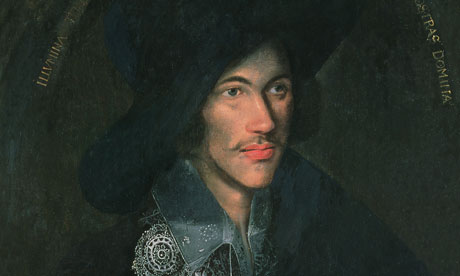
Like many of us, he thought too much about everything.
It was always the complaint against John Donne's love poetry, during the centuries that his work was neglected – Dr Johnson complained that he "perplexes the minds of the fair sex with nice speculations of philosophy". Yet, for most of us now, he is often one of the most physical and sensual of love poets – he had to wait to find his readership. As a young rake, he mocks the women he seduces for falling for his charm – he is not always likable in the early songs and sonnets, but he tells us things we need to know about lust and its often tawdry fulfilment.
He was a clever man, who fell, in the end, for a clever woman, it seems; one of the few things we know about the very young woman for whom he wrecked his career – they married secretly and against her family's wishes – is that she was lonely and bookish as a child. As an adult, burdened with constant childbirth, Anne Donne seems to have been the audience for some of the greatest poems we have that combine spiritual love and earthly passion – perhaps it's a sentimentality to think this mattered to her. And of course, in the end, their love killed her in childbirth.
John was just as passionate, just as over-thinking, in his relationship with religion. When it was originally suggested to him that he could retrieve his lost career by taking holy orders, it is typical of him that he dithered, felt unworthy, was concerned that he might be entering the priesthood for the wrong careerist reasons. Yet for years, faith had been the scab at which he constantly picked – one of the reasons why Donne feels like one of us, even those of us who have no faith, nor want it, is that these are serious matters for him. The search takes time - "On a huge hill, Cragged and steep, Truth stands, and he that will Reach her, about must and about must go." (Satire 3)
He was uncertain of his social status, in an age where to be a gentleman was everything. His mother was, as they say, of good family, but the father who died before he knew him was a tradesman. And his mother's Catholic family had a trade too, to which he did not feel even the slightest bit drawn, and that trade was martyrdom. Thomas More, beheaded for refusing to condone Henry VIII's schism, was his great-grand-uncle; an uncle was imprisoned and exiled for being a Jesuit; his brother died in jail of plague for harbouring a priest. For Donne first of all to conform to the state church, and then to become one of its senior clergy, as dean of St. Paul's, was a serious matter, that looked like time-serving to some. The way he examines his conscience for bad faith is very much of his time, and yet also very modern, almost postmodern.
Yet there is no reason whatever to doubt his sincerity. Donne was not uncritical of the Elizabethan establishment – he spoke out against torture in an age where it was taken for granted as both a way of breaking men and punishing them – but he was clear in his rejection of the choices his kinsmen had made, and the church which had expected it of them. Once the Pope had excommunicated Queen Elizabeth, and said that assassination and support of foreign invasion were the right course of action for committed Catholics, Donne felt it his duty as a citizen to take another side. One of the reasons why Elizabeth's successor James wanted Donne to be a clergyman was that the arguments for conformity Donne had made in his pamphlets were so powerful. The balance between freedom of conscience and the duty of a citizen is a serious matter; it is possible to disagree with the line Donne ended up taking and still be impressed by the arguments that got him there.
We think of him partly as the poet of love, and partly as the poet of death and its terrors – the pain of disease or violence, and the fear of hell. Donne had been to war; friends had been far too close for comfort to treason and its hideous punishments; his wife died and he feared it was his fault. Those of us who have seen fewer nightmares, and who share neither his hope of heaven nor his fear of damnation can still share with him his sense of unworthiness, his sense of sin, his hope of reconciliation to the end of life.

